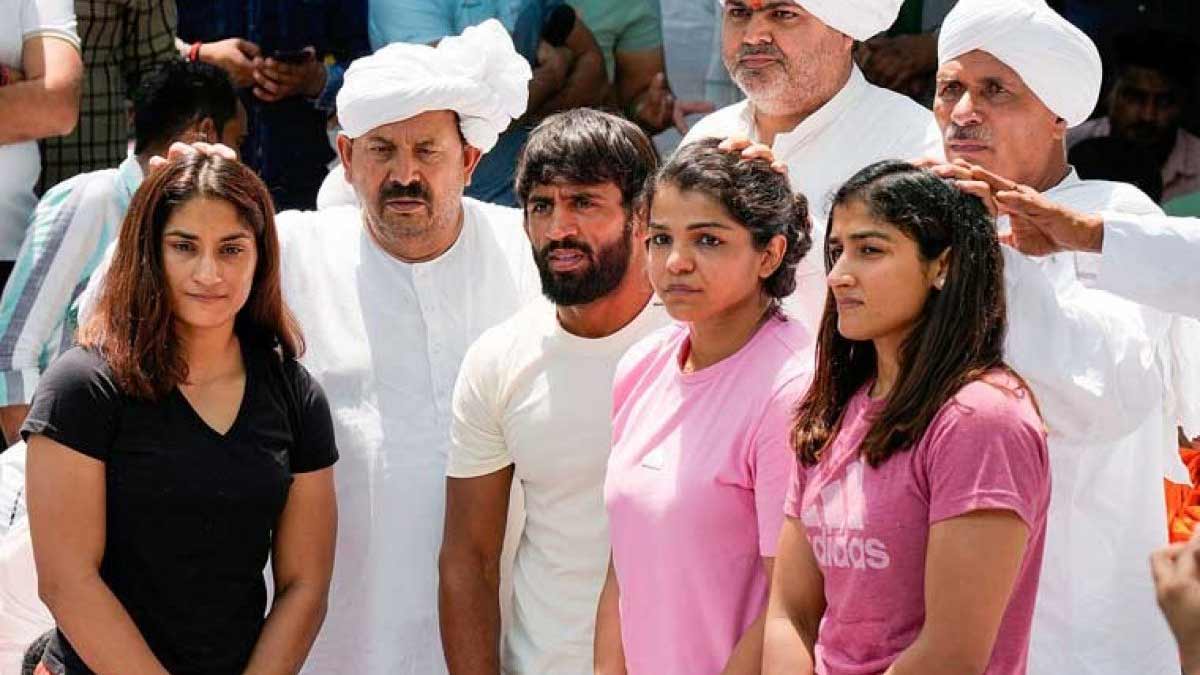The year 2023 was a defining one for wrestling, not for any podium finish but for the large-scale protests by Indian wrestlers, primarily women, against the then Wrestling Federation of India chief Brij Bhushan Sharan Singh, whom they accused of sexual harassment.
It was unprecedented, both in terms of the scale and longevity. Sakshi Malik, Vinesh Phogat and Bajrang Punia were the faces of the protest, with the agitators demanding that Singh be removed from the post and charged and tried in the court of law.
In May last year, as part of the protest, the wrestlers, led by the trio, were detained by Delhi Police when they attempted to march towards the new Parliament building for women's 'Mahapanchayat'. Alleging mistreatment by the cops and the Union government, the wrestlers decided to immerse their medals in Ganga, as a mark of protest.
ALSO READ: 'Will throw our medals in Ganga': Wrestlers issue threat after police 'brutality'
The police high-handedness came in for severe criticism from eminent sportspersons like Abhinav Bindra, Sunil Chhetri and Kapil Dev.
But, what was set to be the ultimate show of defiance, ended in a whimper as the wrestlers returned without immersing the medals in Ganga, after they were 'convinced' by the Khap and farmer leaders to drop the plan. Senior farmer leaders Sham Singh Malik and Naresh Tikait, reportedly, collected their medals in their turbans and sought five days' time then from the grapplers to resolve the issue.
ALSO READ: Wrestlers must not immerse their medals in water, says Barkha Dutt
However, Malik has now revealed in her autobiography Witness that things were not what met the eye on that day. Excerpts published by The Hindu present Malik's version of the chain of events. On one hand, Punia was speaking to Home Minister Amit Shah over the phone. On the other, Tikait, who, as Malik wrote, was “one of the leaders of the farm rights agitation from a year ago and whom we respected as an elder of the Jat community we belonged to”, asked them to refrain from immersing their medals in the Ganga till he talked to them.
Malik further wrote that the crowd got bigger as they waited, and her heart began to sink. “And then, suddenly, from the midst of that crowd, Tikait emerged. He unwrapped the safa on his head, walked up to each of us, took our medals and placed them in that cloth. He told us the medals were the pride of the country and he’d make things all right.
“Then he walked away from the ghat, leaving us there by ourselves.”
Malik added that the wrestlers soon realised their mistake, that what “was supposed to be a great act of defiance had turned into a complete farce”. “All of us sat in a car in a state of complete bewilderment. We were crying.”
The wrestlers were then taken to Tikait's house, where he addressed a press conference, claiming credit for stopping the grapplers from immersing the medals in the river, Malik wrote.
“It was his moment to shine. As for us, we had been completely dishonoured.
“Later, people would tell us that Tikait, for all his image of confronting the government, had a history of selling out movements he had been part of, and he’d done the same to us. I don’t know the truth about that, but the fact is that the mistake of actually handing over the medals was made by us.”


